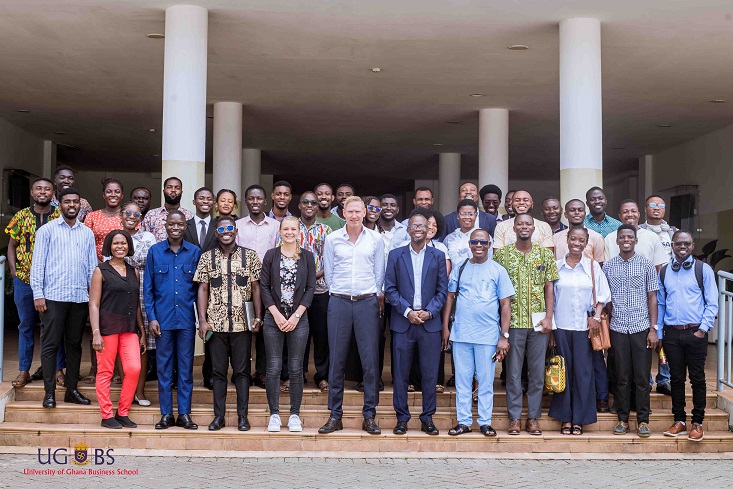
UGBS Organises Public Lecture on Policy Evaluation Using Randomised Controlled Trials
The University of Ghana Business School (UGBS) held a Public Lecture on Policy Evaluation Using Randomised Controlled Trials (RCTs) on 2nd October 2025 at the UGBS Graduate Campus. The event brought together graduate students, researchers, and academics whose work involves designing and evaluating interventions and policies, with particular emphasis on economics, finance, health, agriculture, and social and public policy. The facilitators for the lecture were Prof. Edward Asiedu from UGBS, Prof. Manuela Fritz from TU Munich, Germany, and Prof. Michael Grimm from the University of Passau, Germany.
The session introduced participants to the concept of randomised controlled trials, beginning with naive evaluation techniques and their limitations, before progressing to the framework of causal inference. The facilitators explained how RCTs enable the identification of causal effects, with applications across businesses, agriculture, health, and education. One case study, presented by Prof. Grimm, examined a randomised field experiment in Burkina Faso comparing cash and matching grants for small firms. Results showed that firms receiving cash grants reported higher survival rates, improved business practices, greater formalisation, and increased resilience to the COVID-19 crisis. Matching grants, however, had limited effects, while neither intervention had a significant impact on profits, sales, or employment.
A second case study, drawn from Indonesia, examined how Facebook advertisements affected participation in diabetes screening, highlighting the value of RCTs in health interventions. The lecture also addressed practical challenges in implementing RCTs, such as attrition, spillovers, and external validity. Issues like non-compliance, selective attrition, and behavioural effects, including the Hawthorne and John Henry effects, were discussed. The facilitators concluded that while increasing profits and employment remains difficult, flexible cash grants can be a cost-effective tool to strengthen firm survival and investment in fragile contexts. The lecture was interactive and participatory, equipping students and researchers with knowledge to apply RCTs in evaluating policies across diverse fields.